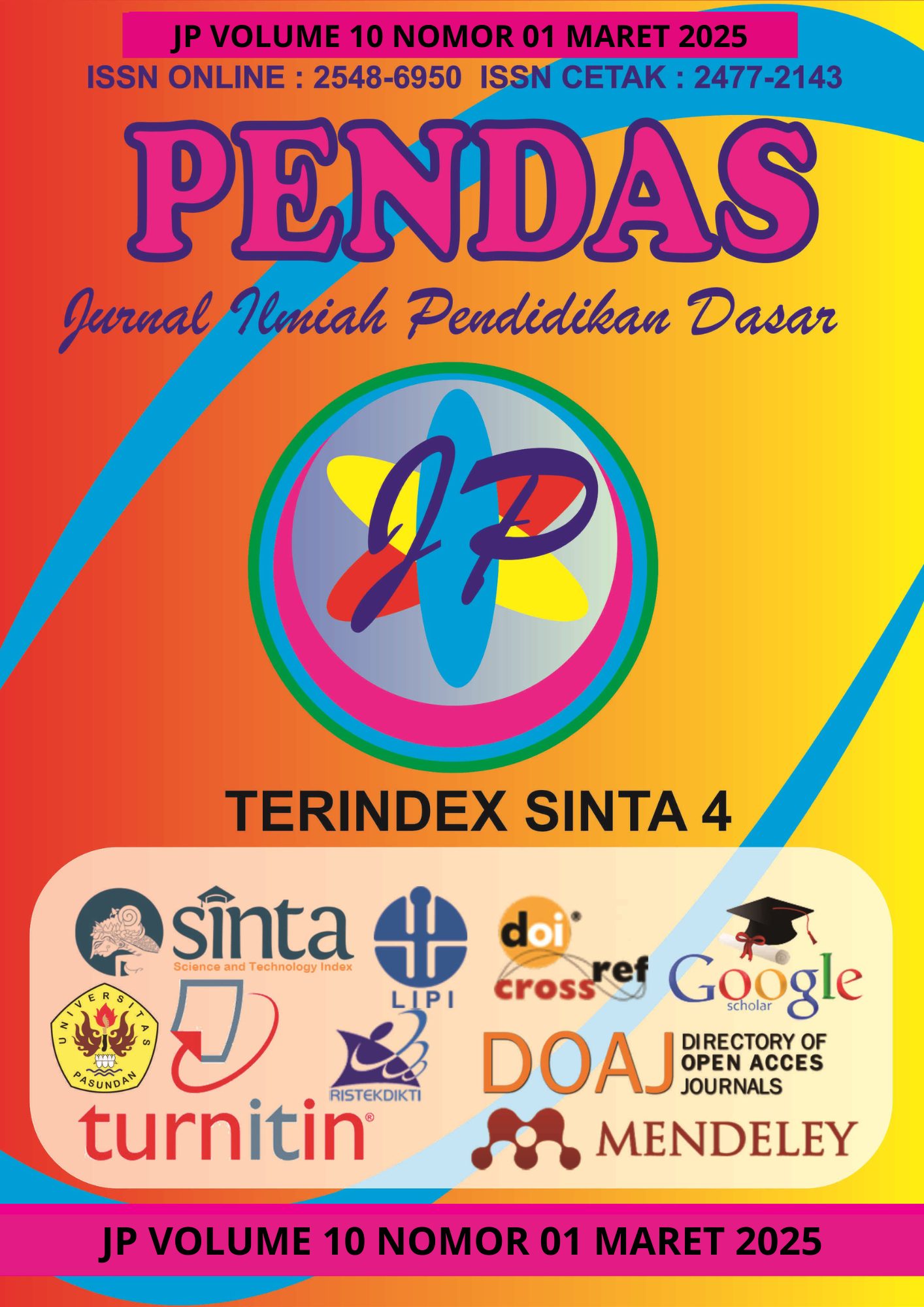PENGARUH MODEL PROBLEM BASED LEARNING PADA MATERI WUJUD ZAT DAN PERUBAHANNYA TERHADAP KEMAMPUAN BERPIKIR REFLEKTIF SISWA KELAS IV DI SEKOLAH DASAR
DOI:
https://doi.org/10.23969/jp.v10i01.23111Keywords:
Problem Based Learning, Natural Sciences, Reflective Thinking Ability, Change of matterAbstract
Reflective thinking is important for students, especially during the learning process
because it is used to support students so that they can more easily understand the
material and can can be optimally involved. The results of interviews with teachers
that there are still learning difficulties, one example is students who are difficult to
condition and have not implemented student reflective thinking. This study was
conducted with the aim of analyzing the effect of applying the Problem Based
Learning (PBL) model on the reflective thinking ability of grade IV students on the
material of the form of substances and their changes. This research was conducted
at SDN Dr. Sutomo 5 Surabaya. Using Descriptive qualitative methods and data
collection using observation, tests, and questionnaires. Based on the analysis of the
average value of experimental class 1 is 83.2 and the value of experimental class 2
is 81.2. The results of the t test analysis of experimental class 1 obtained pretest
and posttest with t count 11.35> t table 2.06 and p-value 0.00 <0.05. Meanwhile, the
experimental class 2 obtained t count 7.53 > t table 2.06 and p-value 0.00 < 0.05.
Furthermore, the N-Gain value of experimental class 1 is 0.60 and experimental
class 2 with an average of 0.54. The results of student responses show that
experimental class 1 is superior in understanding, while experimental class 2 is
superior in understanding and habitual action. It can be concluded that the problembased learning model has an effect on the reflective thinking skills of fourth grade
students on the material of the form of substances and their behavior.
Downloads
References
Ariestyan, Y., & Kurniati, D. (2016). Proses Berpikir Reflektif Siswa Dalam Menyelesaikan Soal Matematika Materi Sistem Persamaan Linear Dua Variabel. 7(1).
Dervent, F. (2015). The effect of reflective thinking on the teaching practices of preservice physical education teachers.
Hotimah, H. (2020). Penerapan Metode Pembelajaran Problem Based Learning Dalam Meningkatkan Kemampuan Bercerita Pada Siswa Sekolah Dasar. Jurnal Edukasi, 7(3), 5. https://doi.org/10.19184/jukasi.v7i3.21599
Iskandar, A. A., Ully, R., Misbah, I., & Nursalman, M. (2025). Perbandingan Hasil Uji Normalitas dan Homogenitas Data Pretest dan Posttest Siswa dengan Menggunakan Software SPSS dan Microsoft Excel. 9.
Nurul, A. (2023). Metodologi Penelitian 1.
Raman, R., Yadav, A., Kumar, A., & Kumar, U. (2022). Application of MS Excel for Agricultural Data Exploration.
Ratnasari, A. D., Wahyudi, W., & Permana, I. (2022). Penerapan Problem Based Learning Untuk Meningkatkan Hasil Belajar Peserta Didik Pada Pembelajaran Tematik. Scholaria: Jurnal Pendidikan dan Kebudayaan, 12(3), 261–266. https://doi.org/10.24246/j.js.2022.v12.i3.p261-266
Redmond, P. (2014). Reflection as an Indicator of Cognitive Presence. E-Learning and Digital Media, 11(1), 46–58. https://doi.org/10.2304/elea.2014.11.1.46
Rosmiati, R., Liliasari, L., Tjasyono, B., Ramalis, T. R., & Satriawan, M. (2020). Analysis of Pre-Service Teachers’ Reflective Thinking Ability Profile on Earth Physics Lectures. Jurnal Pendidikan Fisika, 8(1), 56–63. https://doi.org/10.26618/jpf.v8i1.3111
Rosmiati, Satriawan, M., Rachmadtullah, R., & Satianingsih, R. (2024). Designing ocean climate lecture-based prediction-argumentation to improve reflective thinking of pre-service teacher in Indonesia. Reflective Practice, 25(6), 733–746. https://doi.org/10.1080/14623943.2024.2398774
Safitri, R., Subekti, E. E., & Nafiah, U. (2023). Analisis Penerapan Model Problem Based Learning Pada Pembelajaran IPAS Kelas IV Di SD Supriyadi Semarang.
Sugiyono. (2013). Metode Penelitian Kuantitatif, Kualitatif dan R&D.
Downloads
Published
Issue
Section
License
Copyright (c) 2025 Pendas : Jurnal Ilmiah Pendidikan Dasar

This work is licensed under a Creative Commons Attribution 4.0 International License.














































